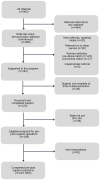How and when doula support increases confidence in women experiencing socioeconomic adversity: Findings from a realist evaluation of an Australian volunteer doula program
- PMID: 35771881
- PMCID: PMC9246160
- DOI: 10.1371/journal.pone.0270755
How and when doula support increases confidence in women experiencing socioeconomic adversity: Findings from a realist evaluation of an Australian volunteer doula program
Abstract
How women are cared for while having a baby can have lasting effects on their lives. Women value relational care with continuity-when caregivers get to know them as individuals. Despite evidence of benefit and global policy support, few maternity care systems across the world routinely offer relational continuity. Women experiencing socioeconomic adversity have least access to good quality maternity care. Community-based doula support programs offer complementary care for these women and are known to, on average, have positive outcomes. Less understood is how, when, and why these programs work. A realist evaluation of an Australian volunteer doula program explored these questions. The program provides free social, emotional, and practical support by trained doulas during pregnancy, birth, and early parenting. This paper reports the testing and refinement of one program theory from the larger study. The theory, previously developed from key informant interviews and rapid realist review of literature, hypothesised that support increased a woman's confidence via two possible pathways-by being with her and enabling her to see her own strength and value; and by praising her, and her feeling validated as a mother. This study aimed to test the theory in realist interviews with clients, focus groups with doulas, and with routinely collected pre-post data. Seven English-speaking and six Arabic-speaking clients were interviewed, and two focus groups with a total of eight doulas were conducted, in January-February 2020. Qualitative data were analysed in relation to the hypothesised program theory. Quantitative data were analysed for differential outcomes. Formal theories of Recognition and Relational reflexivity supported explanatory understanding. The refined program theory, Recognition, explains how and when a doula's recognition of a woman, increases confidence, or not. Five context-mechanism-outcome configurations lead to five outcomes that differ by nature and longevity, including absence of felt confidence.
Conflict of interest statement
The authors have declared that no competing interests exist.
Figures
Similar articles
-
Matching of woman and doula, and the generation of trust in an Australian volunteer doula program: Findings from a realist evaluation.Health Soc Care Community. 2022 Nov;30(6):e5423-e5433. doi: 10.1111/hsc.13965. Epub 2022 Aug 4. Health Soc Care Community. 2022. PMID: 35924682 Free PMC article.
-
An Australian doula program for socially disadvantaged women: Developing realist evaluation theories.Women Birth. 2020 Sep;33(5):e438-e446. doi: 10.1016/j.wombi.2019.10.007. Epub 2019 Nov 24. Women Birth. 2020. PMID: 31776064
-
A qualitative study of volunteer doulas working alongside midwives at births in England: Mothers' and doulas' experiences.Midwifery. 2018 Jan;56:53-60. doi: 10.1016/j.midw.2017.10.002. Epub 2017 Oct 6. Midwifery. 2018. PMID: 29078074
-
Multisite implementation of trained volunteer doula support for disadvantaged childbearing women: a mixed-methods evaluation.Southampton (UK): NIHR Journals Library; 2015 Mar. Southampton (UK): NIHR Journals Library; 2015 Mar. PMID: 25834865 Free Books & Documents. Review.
-
Indigenous Doulas: A literature review exploring their role and practice in western maternity care.Midwifery. 2019 Aug;75:52-58. doi: 10.1016/j.midw.2019.04.005. Epub 2019 Apr 16. Midwifery. 2019. PMID: 31003022 Review.
Cited by
-
Use of volunteers in early years interventions for parents: A scoping review of roles and the extent of evaluation research in this area.PLoS One. 2024 Sep 26;19(9):e0305551. doi: 10.1371/journal.pone.0305551. eCollection 2024. PLoS One. 2024. PMID: 39325752 Free PMC article.
References
-
- World Health Organization. Companion of choice during labour and childbirth for improved quality of care: Evidence to action brief. Geveva: World Health Organization, 2016.
-
- World Health Organization. WHO recommendation on respectful maternity care during labour and childbirth. Geneva: World Health Organization, 2018.
-
- De Souza R. Cultural safety: On healing the health system through partnership 2019 [cited 2021 25 June].
Publication types
MeSH terms
LinkOut - more resources
Full Text Sources




